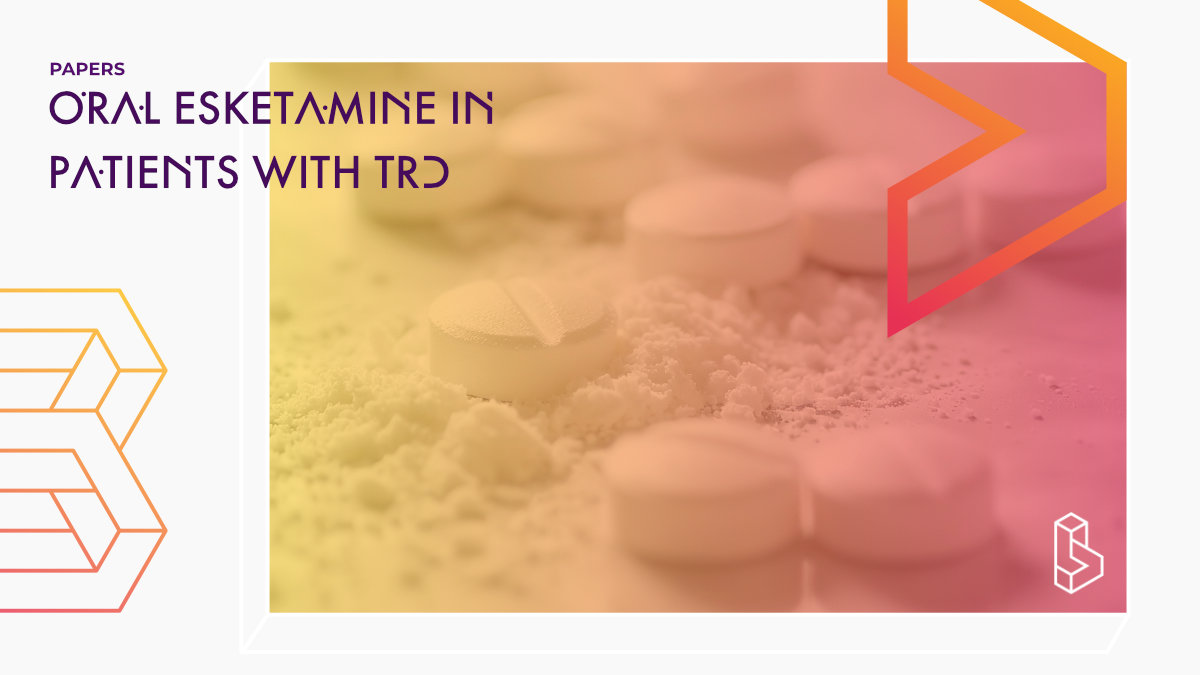This randomized placebo-controlled trial (n=111) investigated the efficacy, safety, and tolerability of fixed low-dose oral esketamine (3x p/d 42d; 30-90mg; oral) in patients with treatment-resistant depression (TRD). Results indicate that fixed low-dose oral esketamine did not show benefit on depressive symptom severity compared to placebo, but individually titrated higher doses in the open-label extension phase demonstrated potential antidepressant properties.
Abstract of Oral esketamine in patients with treatment-resistant depression: a double-blind, randomized, placebo-controlled trial with open-label extension
“About one-third of patients with depression do not achieve adequate response to current treatment options. Although intravenous and intranasal administrations of (es)ketamine have shown antidepressant properties, their accessibility and scalability are limited. We investigated the efficacy, safety, and tolerability of generic oral esketamine in patients with treatment-resistant depression (TRD) in a randomized placebo-controlled trial with open-label extension. This study consisted of 1) a six-week fixed low-dose treatment phase during which 111 participants received oral esketamine 30 mg or placebo three times a day; 2) a four-week wash-out phase; and 3) an optional six-week open-label individually titrated treatment phase during which participants received 0.5 to 3.0 mg/kg oral esketamine two times a week. The primary outcome measure was change in depressive symptom severity, assessed with the Hamilton Depression Rating Scale (HDRS17), from baseline to 6 weeks. Fixed low-dose oral esketamine when compared to placebo had no benefit on the HDRS17 total score (p = 0.626). Except for dizziness and sleep hallucinations scores, which were higher in the esketamine arm, we found no significant difference in safety and tolerability aspects. During the open-label individually titrated treatment phase, the mean HDRS17 score decreased from 21.0 (SD 5.09) to 15.1 (SD 7.27) (mean difference −6.0, 95% CI −7.71 to −4.29, p < 0.001). Our results suggest that fixed low-dose esketamine is not effective in TRD. In contrast, individually titrated higher doses of oral esketamine might have antidepressant properties.”
Authors: Sanne Y. Smith-Apeldoorn, Jolien K. E. Veraart, Jeanine Kamphuis, Jan Spijker, Annemarie van der Meij, Antoinette D. I. van Asselt, Marije aan het Rot & Robert A. Schoevers
Summary of Oral esketamine in patients with treatment-resistant depression: a double-blind, randomized, placebo-controlled trial with open-label extension
Introduction
Major depressive disorder (MDD) is one of the leading causes of disease burden worldwide. There is a pressing need to develop new treatment strategies for MDD. Infusion of the NMDAR antagonist ketamine can reduce depressive symptoms in patients with TRD, but the effects are short-lived. A nasal spray version of ketamine has been approved for TRD, but is considered unlikely to be cost-effective.
In a double-blind, randomized, placebo-controlled, parallel-group trial, we investigated the antidepressant efficacy of fixed low-dose oral esketamine in patients with TRD. We also offered an open-label treatment with flexible higher-dose oral esketamine in the same subjects who participated in the fixed low-dose placebo-controlled trial.
Find this paper
https://doi.org/10.1038/s41380-024-02478-9
Paywall | Google Scholar | Backup | 🕊
Cite this paper (APA)
Smith-Apeldoorn, S., Veraart, J. K. E., Kamphuis, J., Spijker, J., van der Meij, A., van Asselt, A., ... & Schoevers, R. (2023). Oral esketamine in patients with treatment-resistant depression: a double-blind, randomized, placebo-controlled trial with open-label extension.
Study details
Compounds studied
Ketamine
Placebo
Topics studied
Treatment-Resistant Depression
Depression
Study characteristics
Placebo-Controlled
Double-Blind
Open-Label
Randomized
Participants
111
Humans
Linked Clinical Trial
Oral ketamine as an additional treatment in patients with treatment-resistant depressionThis double-blind, randomised controlled trial (n=128) aims to investigate the antidepressant efficacy of oral esketamine augmentation in patients with treatment-resistant major depressive disorder (TRD), who have not responded adequately to standard antidepressants.

